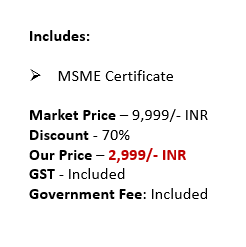msme Registration
- Basic
Enquire Us
MSME Registration
MSME registration stands for Micro, Small and Medium Enterprises registration, which is a government initiative to promote and support small and medium-sized enterprises in India.
Here are some important details related to MSME registration:
Eligibility for MSME Registration
The eligibility criteria for MSME registration in India are based on the investment in plant and machinery or equipment for manufacturing enterprises, and investment in equipment for service sector enterprises. The eligibility criteria for MSME registration are as follows:
- Micro Enterprises: The investment in plant and machinery or equipment should be up to Rs. 1 crore.
- Small Enterprises: The investment in plant and machinery or equipment should be more than Rs. 1 crore but less than Rs. 10 crore.
- Medium Enterprises: The investment in plant and machinery or equipment should be more than Rs. 10 crore but less than Rs. 50 crore.
It is important to note that the above-mentioned investment limits may vary depending on the sector or industry of the enterprise. For instance, the investment limits for enterprises engaged in the manufacture of biodegradable plastics and recycling of waste may be different from the standard limits.
Additionally, the MSME registration is available for enterprises engaged in manufacturing and service sectors, such as:
- Manufacturing Enterprises: Enterprises engaged in the manufacturing or production of goods are eligible for MSME registration.
- Service Enterprises: Enterprises engaged in providing or rendering services, such as restaurants, salons, and IT services, among others, are eligible for MSME registration.
In order to be eligible for MSME registration, the enterprise should meet the above-mentioned criteria and have valid registration documents, such as PAN card, Aadhaar card, and business registration proof, among others. It is recommended to consult with a legal or financial professional for any questions or clarifications related to MSME eligibility criteria.
- Classification: MSMEs are classified based on their investment in plant and machinery or equipment. Micro enterprises have an investment of up to Rs. 1 crore, small enterprises have an investment of up to Rs. 10 crore, and medium enterprises have an investment of up to Rs. 50 crore.
- Renewal: The MSME registration is valid for a lifetime, and there is no need to renew it. However, the MSMEs are required to update their information regularly, such as in case of change of address or increase in investment.
MSME registration is an important step for small and medium-sized enterprises to access various government schemes and subsidies and to avail benefits such as protection from delayed payments and easier access to credit and loans. It is recommended that individuals and entities seeking MSME registration consult with a legal or financial professional for any questions or clarifications related to the process or benefits.
Benefits of MSME Registration
Here are some key benefits of MSME registration in India in bullet points:
- Access to government schemes and subsidies
- Protection from delayed payments
- Easier access to credit and loans
- Tax exemptions and benefits
- Brand recognition
- Access to government tenders and contracts
MSME registration provides small and medium-sized enterprises with several advantages, such as access to government support, protection from delayed payments, and easier access to credit and loans, among others.
It is recommended that individuals and entities seeking MSME registration consult with a legal or financial professional for any questions or clarifications related to the process or benefits.
Registration process for MSME
The registration process for MSME in India is a simple and straightforward online process that can be completed on the Udyog Aadhaar website. Here are the steps involved in the MSME registration process:
- Visit the Udyog Aadhaar website (https://udyogaadhaar.gov.in/UA/UAM_Registration.aspx).
- Fill in the necessary information such as Aadhaar number, name of the enterprise, type of organization, and address, among others.
- Enter the bank details of the enterprise, such as the account number, IFSC code, and bank name.
- Provide the details of the business activity, such as the type of industry, number of employees, and investment in plant and machinery or equipment.
- Submit the application and receive the MSME registration certificate.
The documents required for MSME registration include Aadhaar card, PAN card, business registration proof, address proof, and investment details.
It is important to note that MSME registration is free of cost, and there is no fee or charge for the registration process. The MSME registration certificate is valid for a lifetime and does not require any renewal. However, the enterprise is required to update its information regularly, such as in case of change of address or increase in investment.
Documents Required For Msme Registration
Here is a list of documents required for MSME registration in India in short and bullet points:
- Aadhaar card of the authorized signatory or the proprietor or partners of the enterprise.
- PAN card of the enterprise.
- Business registration proof, such as the partnership deed, memorandum of association, or certificate of incorporation.
- Address proof of the enterprise, such as electricity bill, telephone bill, or lease agreement.
- Bank account details of the enterprise, such as the account number, IFSC code, and bank name.
- Investment details of the enterprise, such as the investment in plant and machinery or equipment.
It is important to note that the specific documents required for MSME registration may vary depending on the nature of the enterprise and the state in which it operates. It is recommended to consult with a legal or financial professional for any questions or clarifications related to the documents required for MSME registration.
Manufacturing Enterprises For MSME Registrations
The eligibility criteria and documents required for MSME registration of manufacturing enterprises in India are as follows:
Eligibility criteria:
- Micro Enterprises: The investment in plant and machinery should be up to Rs. 1 crore.
- Small Enterprises: The investment in plant and machinery should be more than Rs. 1 crore but less than Rs. 10 crore.
- Medium Enterprises: The investment in plant and machinery should be more than Rs. 10 crore but less than Rs. 50 crore.
It is important to note that the above-mentioned investment limits may vary depending on the sector or industry of the enterprise.
Related Guides
Documents Required
- Aadhaar card
- PAN card
- Business registration proof
- Address proof
- Bank account details
- Investment details of the enterprise
- GST registration certificate
- Pollution control certificate
- NOC from the local authorities
- Business plan or project report

